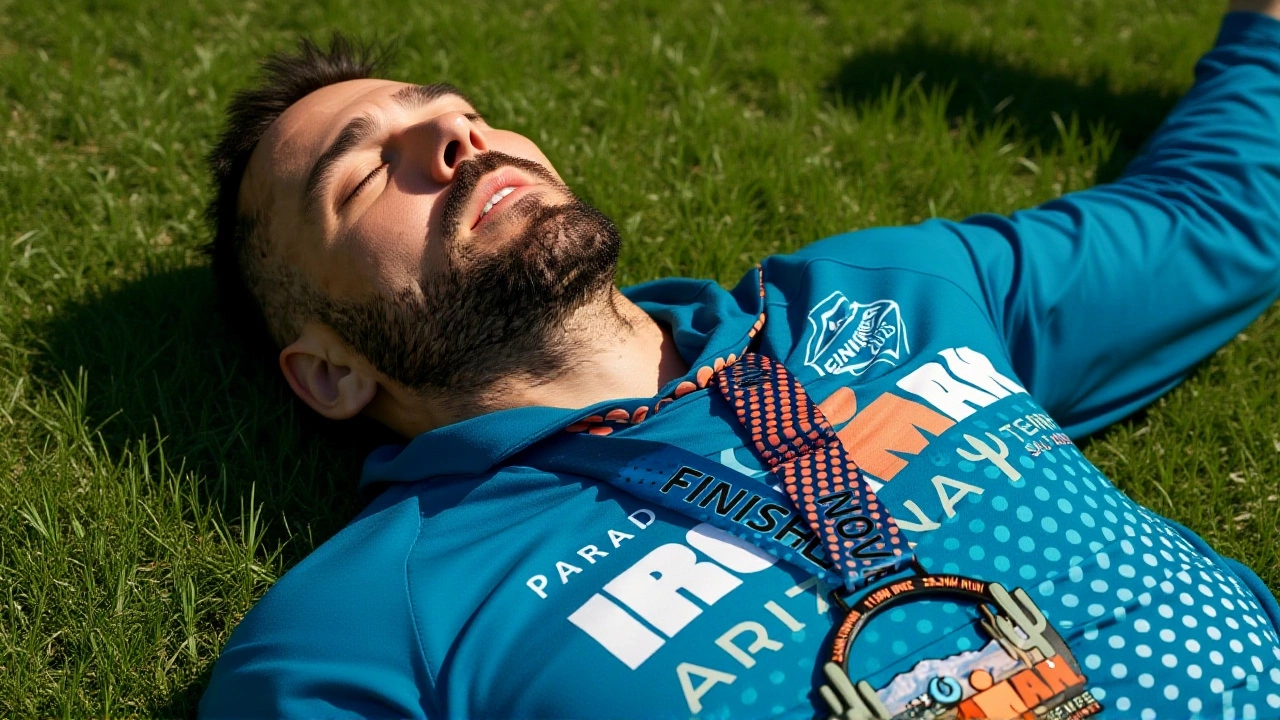Spencer Matthews, the 36-year-old former Spencer Matthews of Made in Chelsea, is sitting across from a team of neuroscientists in a London lab, electrodes on his temples, heart rate monitor clicking softly, as he watches videos of people in distress — and feeling nothing. Not out of cruelty, he insists, but because he genuinely doesn’t feel what others feel. That’s the unsettling question at the heart of Spencer Matthews: Am I A Psychopath, a groundbreaking one-off documentary announced by Channel 4 on November 20, 2023, and now in production for a primetime UK broadcast.
"They Said I Was a Psychopath. I Wondered If They Were Right."
It wasn’t a tabloid headline that pushed Matthews into this. It was his wife, Vogue Williams, his mother, his closest friends. Over years of dinners, arguments, and quiet moments, they’d say the same thing: "You don’t react the way normal people do." He’d laugh it off — until he started noticing it too. "I’ve watched people cry at funerals," he told producers, "and I’ve felt nothing. Not sadness. Not pity. Just… observation. Like I’m watching a scene in a movie." That’s when he realized: maybe they weren’t just being dramatic. Maybe he was different. The documentary isn’t about whether he’s a killer. It’s about whether he’s a psychopath — and if that label means he’s broken, or just built differently.The Science Behind the Stigma
Psychopathy isn’t a formal diagnosis in the DSM-5, but it’s a well-documented cluster of traits: shallow affect, lack of empathy, manipulativeness, fearlessness, and grandiosity. Traditionally, it’s been linked to violent criminals — think Hannibal Lecter, not a dad packing school lunches. But research from University College London and King’s College London over the past decade shows something else: many high-performing CEOs, surgeons, and even reality TV stars display psychopathic traits without ever breaking the law. Matthews will undergo a battery of tests: the Hare Psychopathy Checklist-Revised, fMRI scans measuring brain activity during emotional stimuli, and a "Reading the Mind in the Eyes" test that measures his ability to infer emotion from facial expressions. He’ll also be observed in controlled social settings — how he responds to a staged crisis, how he comforts someone in pain, whether he mirrors emotions or just mimics them. "We’re not trying to pathologize him," says Dr. Eleanor Hart, a lead neuropsychologist on the project. "We’re asking: can someone with these traits still be a good husband? A devoted father? Can psychopathy be a tool — not a curse?"A Father, a Husband, a Reality Star
Matthews rose to fame on Made in Chelsea (2011–2016), a show that thrived on emotional drama. But even then, viewers noticed something off. He didn’t cry during breakups. He didn’t apologize when he hurt people. He’d say things like, "I don’t need to feel guilty to move on." His fans called him "cold." Critics called him "toxic." He didn’t mind. "I thought it was confidence," he says in early footage. Now, as co-host of The Pure Gold Podcast with Williams — and father to their three children — his life looks like the British middle-class ideal. He picks up his kids from school. He attends parent-teacher meetings. He makes Sunday roast. But inside, he still feels like an outsider. "I love them," he says, looking at family photos. "I just… don’t feel them the way I think I’m supposed to."
Is There Such a Thing as a Good Psychopath?
This is where the documentary gets radical. Channel 4 isn’t just exploring Matthews — it’s challenging the entire cultural narrative. Psychopathy isn’t just about monsters. It’s about people who don’t get overwhelmed by emotion. Who can make tough calls. Who don’t panic under pressure. Who rise to the top because they’re not weighed down by guilt or fear. Studies show that corporate leaders with high psychopathic traits are more likely to take risks, negotiate aggressively, and recover quickly from failure. Surgeons with low empathy scores have higher success rates in high-stakes operations. Even firefighters and special forces soldiers often score high on psychopathy scales — not because they’re cruel, but because they stay calm when others break down. "We’re not saying Spencer is a psychopath," says Channel 4’s head of documentaries, James Lister. "We’re saying: what if the traits society calls ‘cold’ are the same ones that make someone brilliant? What if the problem isn’t him — it’s our definition of normal?"Why This Matters Beyond One Man
This isn’t just about Spencer Matthews. It’s about millions of people who feel like they don’t fit the emotional mold. Who’ve been told they’re "too detached," "too logical," "not sensitive enough." Who’ve internalized shame for not crying at weddings or feeling overwhelmed by sad movies. The documentary arrives at a moment when mental health conversations are shifting — from "fixing broken people" to "understanding human variation." The UK’s National Health Service has already begun training therapists to recognize non-pathological emotional differences. This film could accelerate that. If Matthews is found to have psychopathic traits — and still be a loving father — it could change how we judge people. Not by how much they feel, but by how they act.
What’s Next?
No air date has been set, but production is ongoing in London, with final edits expected by early 2025. Channel 4 plans a companion online series featuring interviews with psychologists, former convicts with psychopathic traits, and everyday people who’ve been labeled "cold" by loved ones. Matthews says he’s not doing this for ratings. "I’m doing it because I want to know if I’m broken — or if I’m just not broken the way everyone else is."Frequently Asked Questions
What defines psychopathy, and how is it different from antisocial personality disorder?
Psychopathy is a clinical construct based on traits like lack of empathy, superficial charm, and emotional detachment — often measured by the Hare PCL-R. Unlike antisocial personality disorder (ASPD), which focuses on criminal behavior and rule-breaking, psychopathy can exist without any illegal acts. Many psychopaths are highly functional, even successful, which is why this documentary is so unusual — it examines the trait in someone who’s never broken the law.
Can someone with psychopathic traits be a good parent?
Yes — but not in the way most people expect. Research from the University of Cambridge shows that parents with psychopathic traits can be highly structured, consistent, and protective — they just don’t express affection the same way. Their love is shown through action, not emotion. Spencer Matthews’ ability to provide stability, routine, and financial security for his three children may be exactly what his kids need — even if he doesn’t tear up at their school plays.
Why did Channel 4 choose Spencer Matthews for this documentary?
Matthews is uniquely positioned: a public figure with years of documented emotional detachment, who’s voluntarily sought out scrutiny. He’s not hiding behind a celebrity persona — he’s openly questioning himself. His marriage to Vogue Williams, a highly emotional public figure, creates a compelling contrast. Channel 4 saw an opportunity to explore a real, lived experience — not a stereotype.
Are psychopathic traits genetic, or can they be developed?
Evidence suggests both. Twin studies show a strong hereditary component, but early childhood trauma, neglect, or extreme privilege can also shape emotional development. Matthews grew up in a wealthy London household — his father was a financier. Some experts speculate that his emotional detachment may stem from being raised in an environment where feelings were suppressed in favor of performance and control.
Will the documentary diagnose Spencer as a psychopath?
No. The film won’t give a clinical label. Instead, it will present his test results alongside expert commentary, letting viewers draw their own conclusions. The goal isn’t to label him — it’s to challenge the viewer’s assumptions about what "normal" emotion looks like. As one psychologist puts it: "We don’t know if he’s a psychopath. But we know he’s human — and that’s what matters."
How does this documentary fit into Channel 4’s history of programming?
Channel 4 has long specialized in socially provocative documentaries, from My Transgender Child to The Truth About Mental Health. This fits squarely in that tradition: using personal stories to dissect taboo topics. Unlike sensationalist reality TV, this isn’t about shock — it’s about nuance. It’s the kind of programming that sparks debate in classrooms, pubs, and GP waiting rooms across the UK.
